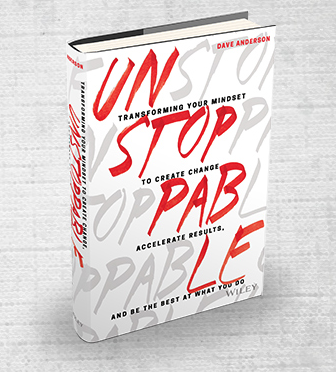[Originally aired 2/23/18]
Your culture, what’s that worth? Team morale, momentum, your brand, the customer experience, the team member experience, your own credibility as a leader. You will lose the respect of the best when you don’t deal effectively with the worst. Accountability.
On this episode of Hard Truths with Dave Anderson, Dave talks about accountability and what its worth to you and your business.
ABOUT DAVE ANDERSON


Dave has given over 2,000 speeches over the past two decades on sales and leadership development and spoken in seventeen countries.
Dave is the author of fourteen books, including the TKO Business Series, Up Your Business, If You Don’t Make Waves You’ll Drown, How to Run Your Business by THE BOOK, How to Lead by THE BOOK, and It’s Not Rocket Science. His latest is Unstoppable: Transforming Your Mindset to Create Change, Accelerate Results, and Be the Best at What You Do.
VIDEO TRANSCRIPT:
Hi, welcome to Hard Truths with Dave Anderson, the show where we talk about the things that need to be talked about but the people don’t want to talk about because of the politically correct times that we live in. I can’t think of a more relevant topic along those lines than accountability. Accountability is, for some reason, become almost a bad word in the society we live in today but especially if you’re in a leadership position. Accountability isn’t an option. It’s your duty. Here’s the deal. If you don’t understand fully the cost of not holding people accountable, you’ll never take it seriously enough.
Let me tell you what you’re putting at risk when people are held accountable. Your culture, what’s that worth? Team morale, momentum, your brand, the customer experience, the team member experience, your own credibility as a leader. Come on, what is that worth? Because you will lose the respect of the best when you don’t deal effectively with the worst. There’s so much at stake and the bigger problem is when you’re not holding people accountable, it’s not like a one-time penalty where you hold your nose and write the penalty check one time. It’s misery on the installment plan. You can see why I say it’s not an option, it’s your duty.
In this show, I want you to think about what type of accountability you have where you’re working right now. I want you to evaluate it. I’m going to give you four levels of accountability. Usually what you’ll find is most places are a blend of the four, but there is one that dominates. If you can’t face it, you won’t fix it. If you don’t acknowledge it, you won’t change it.
Let me start with the worst and I’ll work up to the best and think about where you work and which best describes it. Level four accountability, which is the worst, is simply there’s no accountability. There is none. Somebody comes in late, nothing happens. They come in late again, nothing happens. They missed their numbers, nothing happens. As bad as it sounds, there are some cultures where there is level four accountability. No accountability whatsoever.
Level three is better and I find it’s the most common but it’s not the best. It’s the most common though and it’s top-down. Now, this is necessary. The leaders should be holding people accountable. Let’s say you’re on a sales team of some kind just as an example and the salesperson comes in late. The sales manager or the owner, whatever the hierarchy is, would address the situation. That’s top-down. It’s necessary. It needs to happen but it’s only level three.
Then you’ve got level two accountability, which is far stronger, and it’s peer-to-peer, peer-to-peer. Now this is the sign of a strong team of any kind whether it’s in sports, business, it doesn’t matter. Now, go back to that previous scenario, now you have the salesperson, comes in late. The leader, official leader, doesn’t even have to address it. Another salesperson or salespeople or team members whatsoever have whatever the right may be will address it. They’ll say, “Hey, man. You can’t do that. You got to be here on time with the rest of us. We have a job to do. We have goals to hit. You can’t disrespect the rest of us by being late.”
Now, you have to admit that is far stronger than top-down accountability when you got peers that care enough about what they do, that care enough about the results they’re trying to create. To hold one another accountable, man, that is level two accountability and it is strong and it is rare. I don’t see it nearly enough. I travel a lot. I speak 120 times a year. I’ve spoken in 17 different countries. I write about this stuff in 14 different books. I’ll tell you what. I don’t see nearly enough level two accountability.
Then there’s level one and level one is really where we want to go and it’s self-accountability. You won’t have to hold me accountable because I’m a man or woman of integrity and I’m going to do what I say I’m going to do. I’m going to follow the rules. I’m going to hit the standards. I’m going to live the values. I have a higher expectation for myself than you could ever possibly have for me.
In my book Unstoppable, I talk about this type of performer. It’s the game changer. In fact, I talk about four types of performers: undertakers, caretakers, playmakers and game changers. This is the game changer mindset. I will hold myself accountable. Which best describes what you do and where you work? You probably have a blend. Are you seeing enough level two and level one? If not, you can fix it.
Here’s the thing with accountability. It requires two things: the right skill set and the right mindset. If you’re in a leadership position, those things just don’t come to you in a dream one night. You have to learn them. You have to have the skillset. You have to know what to do, how to do it and then you have to have the mindset. You have to want to do it. Even if you don’t want to do it, you have to do it anyway because it’s the right thing to do.
In future shows, we’re going to be talking a lot about accountability. It’s something that we’re going to dig deep into, give you some tools. But, in my first show, I just wanted to give you some assessment, criteria to see what best describes what it’s like where you work, with what you do. In future shows, we’ll talk about addressing it. But, right now, give it an honest assessment.
Let me give you this closing thought as it relates to accountability. Ambiguity is the enemy of accountability. If you’re not clear, there’s no way you can hold people accountable because the question is accountable for what? And, we’ll get into eliminating ambiguity in our next show.
The Atlanta Small Business Network, from start-up to success, we are your go-to resource for small business news, information, resources.


While you’re here, don’t forget to subscribe to our email newsletter for all the latest business news know-how from Atlanta Small Business Network.






